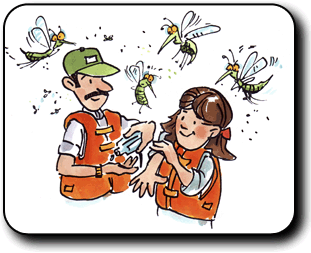 |
| photo credit: nowastewednesdays.com |
1)http://npic.orst.edu/ is the most amazing website! It is the National Pesticide Information Center. They list all ingredients found in insect repellents! ( I could read their entire site for hours, but to go directly to the list: click on the letter I in the alphabet choices along the top then click on Ingredients. Or for more information on making choices, go to the letter I again, but choose Insect Repellents. They have lots of articles on different subjects to help you.
2) Insect repellents can be divided into two categories: Synthetic and Plant Based. The most popular and effective Synthetic is the widely known and used DEET. It is the most tested synthetic chemical to date, it is the most effective insect repellent, but some things you need to know are: It is a solvent and can eat through nylon(like jackets) and spandex clothing (like bathing suits) it can ruin the elastic properties of the fabric.
3) Another synthetic repellent is Picaridin. It is DEET free and has been used by the U.S. Military for many years and is widely regarded as safe for children.
4) Plant based products can be quite effective in repelling insects, but testing has shown that they are not as long lasting as synthetic. If you are interested in trying some plant based repellents such as Lemon Eucalyptus oils, soybean oils, etc. be aware that they need to be reapplied more often than the "spray and forget" DEET you may be used to.
5) Using plant based products sometimes labeled as "natural" does not mean you will not have a skin allergy or intolerance to the product. The plant based chemicals that make insect repellents can cause skin reactions just like the synthetic can, so don't be mislead into thinking your sensitive skinned child will not react to the plant based. They may or may not. Just be aware it is still a chemical you are applying, just derived from a plant not in a lab test tube.
6)Wrist bands imbedded with repellant have been largely found to be ineffective during scientific testing. I could not find testing on the newer little clip on products that I have seen in the stores.
7) If being environmentally friendly is high on your list, make sure you know the source. Many companies that produce plant based repellents may not be using environmentally friendly ways of growing & harvesting the plants, processing the plants to derive the oils used in the repellents or packaging the repellents. If you are passionate about reducing the impact of repellents on the environment, then just do your own research to ensure you feel good about the path your chosen product took to get to you.
8) Combinations of both synthetic and plant may be for you: Many people choose to apply DEET to their child's clothing and plant based products to their skin. You may find this combination gives you the protection and peace of mind you need.
9) Wash or bathe with soap as soon as you return indoors, especially DEET will remain on the skin unless removed with soap. This will help reduce the absorption through the skin.
10) Proper Clothing is the best repellent. In an outdoor setting like camping and hiking,etc. make sure to cover up with long sleeves and long pants. It is the best protection against ticks and other critters. Don't let your kids off the hook in this area. Pulling ticks off of them is definitely worse than making them wear the long sleeves and pants.
